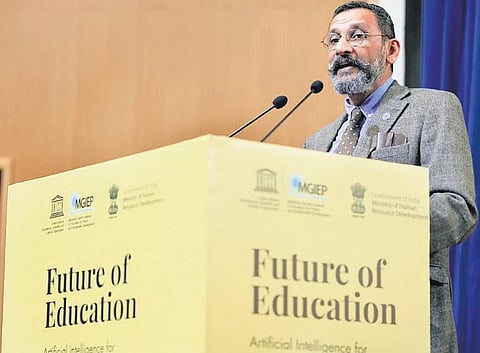

A Day-long seminar on artificial intelligence titled Future of Education – Artificial Intelligence for Social and Emotional Learning just concluded at Ambedkar International Center in Delhi. Organised by the UNESCO Mahatma Gandhi Institute of Education for Peace and Sustainable Development (MGIEP), experts discussed opportunities and challenges in using artificial intelligence (AI) for social and emotional learning (SEL).
Over 400 teachers, educators, students, academics and policymakers participated in the seminar. Director-General, UNESCO Audrey Azoulay, who is on her state visit to India, also attended the event. And so did over 20 students from four countries on Framer Space, the digital learning programme of UNESCO MGIEP. “It is imperative for education systems to go beyond merely applying AI to reinforce existing teaching methodologies. We should explore transformative pedagogical approaches that apply the technology to build cognitive and emotional intelligence of learners,” said Dr Anantha Duraiappah, Director,
UNESCO MGIEP, in his welcome note. He further remarked on how AI’s expected to significantly contribute to education, but at the same time, poses certain challenges that need to be addressed. “And conversations like these can help a lot in meeting those challenges.” The seminar included a live student-led dialogue on critical issues of migration, refugees and civil war. Real-time analytics from Framer Space provided interesting insights into the emotional turmoil students face while talking about these critical issues. This sort of analysis helps educators in creating individualised and non-linear learning paths for students. Panel discussions that followed included The Impact of AI on Human Cognition about the implications on educators and learners; How AI Augment Social and Emotional Learning in which panelists reflected on innovative approaches like analysis of education data and training of educators in using AI for SEL. The third panel discussion was on The Ethical and Practical Concerns in Implementing AI for Education.
Dr Nandini Chatterjee Singh, a cognitive neuroscientist and currently a Senior Project Officer at UNESCO MGIEP shared her experiences and explorations in the neurosciences, and linked these with SEL. Dr Gregoire Borst from the Paris Descartes, CPSC, showcased his findings on helping create an AI-enabled training infrastructure to nurture the emotional intelligence of young learners. The event concluded with an engaging discussion on the ethical concerns of implementing AI for education. During this, Dan Shefet, Specialist Lawyer to UNESCO, Dr Valli Kumari Vatsavayi, Professor of Computer Science and Systems Engineering at the Andhra University and Dr Ronald Baecker, Emeritus Professor of Computer Science and Bell Chair in Human-Computer Interaction at the University of Toronto discussed how education data should be used ethically.